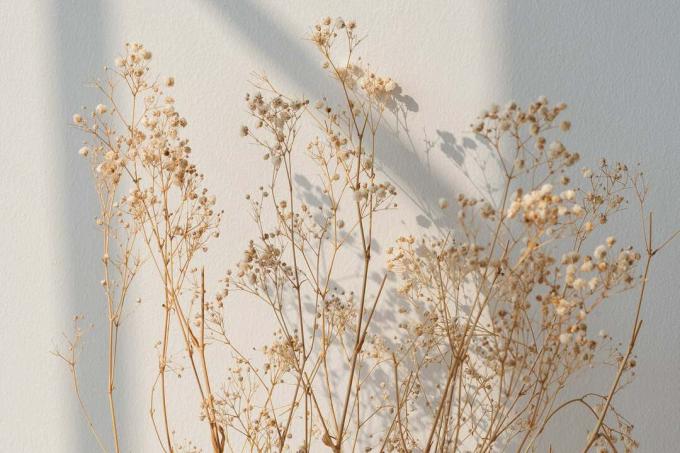
Gypsophila blooms profusely and extravagantly, but not endlessly. In order to be able to enjoy gypsophila over the winter or even longer, it must be preserved by drying it.
In a nutshell
- cut at the right time
- always use fresh
- Air drying
- do not dry too long
Table of contents
- cut gypsophila
- Drying instructions:
- Dry clippings
- frequently asked Questions
cut gypsophila
The tall Gypsophila species of gypsophila are best suited for drying. First of all, the plants or cutting off the individual stems at the right time.

Drying instructions:
- Always cut gypsophila fresh
- right after flowering
- Dew should have dried
- Otherwise there is a risk of rot and mold growth
- ideally cut around noon
- on a sunny day
- Leave the stems as long as possible
- can be trimmed later
Tip: Plants that are already showing wilted or wilted flowers should no longer be used or should be removed. sort out, they would impair the visual appearance.
Dry clippings
The easiest and best way to plants like this gypsophila to preserve is to air dry. This can be outdoors in a dry, shady place or in a suitable room. All you need is gypsophila, scissors and string. Then you can start.
- Remove lower leaves from freshly cut stems
- can shorten drying time
- tie several stems together to form small bouquets
- not too many per bundle, risk of mold growth
- the denser the posy, the longer the drying process
- Hang bundles upside down
- with sufficient distance from each other

If it is not possible to dry outside, a well-ventilated and dry attic or basement is an alternative. The humidity in the drying room should be as low as possible, on the one hand to prevent the formation of mold and on the other hand to shorten the drying time. Until the drying process is complete, you should regularly check the degree of drying of the bouquets and then store them accordingly.
Tip: The advantage of drying is that the plant material hardly changes and can therefore be combined not only for dried bouquets, but also with fresh flower bouquets.
frequently asked Questions
As a rule, the drying process is completed after about two to four weeks. The duration depends on the ambient temperature and the prevailing humidity. You should not leave the gypsophila hanging longer than necessary to dry. The longer the herb hangs, the more porous and brittle it becomes, eventually making it almost impossible to use.
In order for dried gypsophila to last as long as possible, it should be stored in a dark place at room temperature.
Stored in a dry place away from direct sunlight, it usually has a shelf life of up to a year. To extend the shelf life, you can spray the dried plants with hairspray, including the stems. The hairspray preserves the drying material and protects it from premature crumbling. It also protects the colors from fading due to UV light. After spraying, let the whole thing dry well.
Dried gypsophila is particularly good for dried arrangements of all kinds, dried bouquets and a wide variety of flower arrangements. It looks particularly beautiful between red roses, which, by the way, can also be dried. But it is also ideal for handicrafts, for example in combination with greeting cards.



